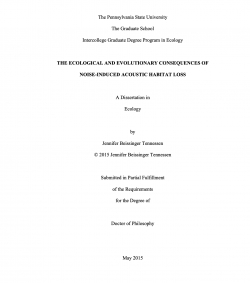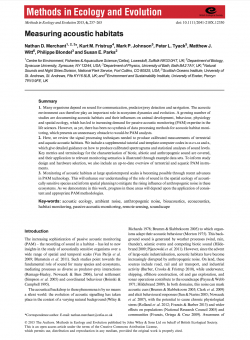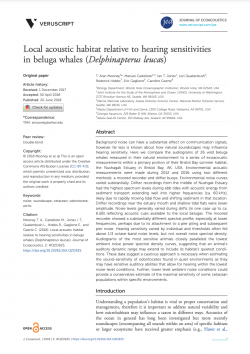The Ecological And Evolutionary Consequences Of Noise-Induced Acoustic Habitat Loss

Type
Thesis
Authors
Tennessen ( Jennifer Beissinger Tennessen )
Category
Thesis
[ Browse Items ]
Publication Year
2015
Publisher
The Pennsylvania State University, United States
URL
[ private ]
Abstract
Anthropogenic threats are facilitating rapid environmental change and exerting novel pressures on the integrity of ecological patterns and processes. Currently, habitat loss is the leading factor contributing to global biodiversity loss. Noise created by human activities is nearly ubiquitous in terrestrial and marine systems, and causes acoustic habitat loss by interfering with species’ abilities to freely send and receive critical acoustic biological information. My dissertation investigates how novel sounds from human activities affect ecological and evolutionary processes in space and time in marine and terrestrial systems, and how species may cope with this emerging novel pressure.
Using species from both marine and terrestrial systems, I present results from a theoretical investigation, and four acoustic playback experiments combining laboratory studies and field trials, that reveal a range of eco-evolutionary consequences of noise- induced acoustic habitat loss. First, I use sound propagation modeling to assess how marine shipping noise reduces communication space between mother-calf pairs of North Atlantic right whales (Eubalaena glacialis), an important unit of an endangered species. I show that shipping noise poses significant challenges for mother-calf pairs, but that vocal compensation strategies can substantially improve communication space. Next, in a series of acoustic playback experiments I show that road traffic noise impairs breeding migration behavior and physiology of wood frogs (Lithobates sylvaticus). This work reveals the first evidence that traffic noise elicits a physiological stress response and suppresses production of antimicrobial peptides (a component of the innate immune response) in anurans. Further, wood frogs from populations with a history of inhabiting noisy sites mounted reduced physiological stress responses to continuous traffic noise exposure. This research using wood frogs suggests that chronic traffic noise exposure has negative physiological consequences, and that populations have adapted over short time- scales to minimize the detrimental impacts of this novel pressure. Finally, I present results from a field acoustic playback experiment that show that noise from the invasive Cuban treefrog (Osteopilus septentrionalis) differentially affects the vocal behavior of native anurans, with those with more similar calls being disproportionally more affected. Green treefrogs (Hyla cinerea) shortened their calls, called louder, and maintained call spacing (e.g. continued actively calling) during noise stimuli whereas pine woods treefrogs (H. femoralis) did not modify vocal behavior in response to any noise stimuli.
Collectively, the results of these investigations (1) provide insight into the extent of noise-induced acoustic habitat loss in space and time, (2) reveal fitness-relevant individual- and population-level consequences of this form of habitat loss, and (3) show resiliency within ecological systems through the individual- and population-level responses to this novel pressure over short time-scales. These findings advance the field by illustrating how the spatiotemporal extent of anthropogenic noise impacts important ecological processes, and by demonstrating the resiliency of some species in responding rapidly to novel pressures.
Using species from both marine and terrestrial systems, I present results from a theoretical investigation, and four acoustic playback experiments combining laboratory studies and field trials, that reveal a range of eco-evolutionary consequences of noise- induced acoustic habitat loss. First, I use sound propagation modeling to assess how marine shipping noise reduces communication space between mother-calf pairs of North Atlantic right whales (Eubalaena glacialis), an important unit of an endangered species. I show that shipping noise poses significant challenges for mother-calf pairs, but that vocal compensation strategies can substantially improve communication space. Next, in a series of acoustic playback experiments I show that road traffic noise impairs breeding migration behavior and physiology of wood frogs (Lithobates sylvaticus). This work reveals the first evidence that traffic noise elicits a physiological stress response and suppresses production of antimicrobial peptides (a component of the innate immune response) in anurans. Further, wood frogs from populations with a history of inhabiting noisy sites mounted reduced physiological stress responses to continuous traffic noise exposure. This research using wood frogs suggests that chronic traffic noise exposure has negative physiological consequences, and that populations have adapted over short time- scales to minimize the detrimental impacts of this novel pressure. Finally, I present results from a field acoustic playback experiment that show that noise from the invasive Cuban treefrog (Osteopilus septentrionalis) differentially affects the vocal behavior of native anurans, with those with more similar calls being disproportionally more affected. Green treefrogs (Hyla cinerea) shortened their calls, called louder, and maintained call spacing (e.g. continued actively calling) during noise stimuli whereas pine woods treefrogs (H. femoralis) did not modify vocal behavior in response to any noise stimuli.
Collectively, the results of these investigations (1) provide insight into the extent of noise-induced acoustic habitat loss in space and time, (2) reveal fitness-relevant individual- and population-level consequences of this form of habitat loss, and (3) show resiliency within ecological systems through the individual- and population-level responses to this novel pressure over short time-scales. These findings advance the field by illustrating how the spatiotemporal extent of anthropogenic noise impacts important ecological processes, and by demonstrating the resiliency of some species in responding rapidly to novel pressures.
Description
https://etda.libraries.psu.edu/catalog?f%5Bkeyword_ssim%5D%5B%5D=wood+frog&f%5Bprogram_name_ssi%5D%5B%5D=Ecology
Number of Copies
1
| Library | Accession No | Call No | Copy No | Edition | Location | Availability |
|---|---|---|---|---|---|---|
| Main | 80 | 1 | Yes |


